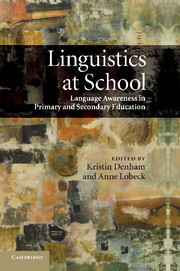Book contents
- Frontmatter
- Contents
- Notes on contributors
- Foreword: The challenge for education
- Introduction
- Part I Linguistics from the top down: encouraging institutional change
- Introduction to Part I
- 1 Ideologies of language, art, and science
- 2 Bringing linguistics into the school curriculum: not one less
- 3 How linguistics has influenced schools in England
- 4 Supporting the teaching of knowledge about language in Scottish schools
- 5 Envisioning linguistics in secondary education: an Australian exemplar
- 6 Linguistics and educational standards: the California experience
- 7 Developing sociolinguistic curricula that help teachers meet standards
- 8 Linguistic development in children's writing: changing classroom pedagogies
- Part II Linguistics from the bottom up: encouraging classroom change
- Part III Vignettes: voices from the classroom
- References
- Index
Introduction to Part I
Published online by Cambridge University Press: 04 August 2010
- Frontmatter
- Contents
- Notes on contributors
- Foreword: The challenge for education
- Introduction
- Part I Linguistics from the top down: encouraging institutional change
- Introduction to Part I
- 1 Ideologies of language, art, and science
- 2 Bringing linguistics into the school curriculum: not one less
- 3 How linguistics has influenced schools in England
- 4 Supporting the teaching of knowledge about language in Scottish schools
- 5 Envisioning linguistics in secondary education: an Australian exemplar
- 6 Linguistics and educational standards: the California experience
- 7 Developing sociolinguistic curricula that help teachers meet standards
- 8 Linguistic development in children's writing: changing classroom pedagogies
- Part II Linguistics from the bottom up: encouraging classroom change
- Part III Vignettes: voices from the classroom
- References
- Index
Summary
The chapters in Part I provide historical background on linguistics in education, in the form of discussion of successful (and not so successful) projects that have resulted by working mainly from the “top down.” The contributors discuss diverse ways to integrate linguistic knowledge at the institutional level, through national or regional curricula, standards and assessment, and teacher training and collaboration, and by working to change ideologies about language and its place in education. Authors also address challenges they've encountered in their work, which may help others avoid such stumbling blocks in the future. Below we outline each chapter, and highlight recurring themes among them.
Edwin Battistella's chapter addresses the public misperceptions about linguistics and the role those misperceptions play in shaping language education; linguistics is irrelevant and academic, descriptivism promotes the elevation of non-standard dialects, and so on. He draws parallels with public perceptions of biology and visual art, both of which have faced resistance for similar reasons. Battistella highlights what we can learn from the challenges faced by other fields and how we can use those lessons to change perceptions of linguistics and encourage institutional change.
Wayne O'Neil's chapter discusses the failure of a “top-down” approach to institutional change in the 1960s (Project English in Oregon State). The rise and fall of this project provides us with important insights into what it takes for large-scale, top-down curricular change to succeed, and what stumbling blocks can arise along the way to derail such projects.
Information
- Type
- Chapter
- Information
- Linguistics at SchoolLanguage Awareness in Primary and Secondary Education, pp. 9 - 12Publisher: Cambridge University PressPrint publication year: 2010
